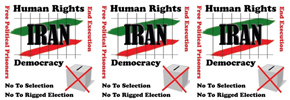Sima Sahar Zerehi – With all due respect to Tunisia, it all started with Iran. No, not with the 1979 revolution as claimed by the Islamic regime’s clumsy PR machine, but with the pro-democracy movement that erupted after the June 2009 Iranian ‘selections.’
Iranians, despite the blocks placed on net freedom, were the original citizen journalists taking over the twitterverse with news and posts about street protests, clashes with government forces, and updates on arrests and upcoming actions.
During the summer of 2009, every Iranian young and old was an internet activist, taking to Facebook and YouTube to verify, translate, and circulate news painstakingly produced by people risking life and limb to capture the mobilizations of the pro-democracy movement and the Islamic regime’s brutality against its own citizens via pictures, videos and posts.
The Islamic regime quickly learned its lesson; it wasn’t enough to target traditional media outlets by blocking foreign journalists from reporting in Iran and muzzling local journalists through a campaign of censorship, fear and intimidation. They needed to have a strategy to deal with bloggers, digital photographers, videographers, and online activists using social media tools to instantaneously disseminate news and reports.
Since that summer we’ve seen an escalation of tactics used to inhibit internet freedom in Iran and many people have become pawns in the regime’s crusade to suppress the online conversation. Individuals as diverse as Iranian-Canadian web developer Saeed Malekpour languishing in Evin prison for doing nothing more than creating a photo uploading software, or Iranian-Canadian blogger Hossein Derakhshan credited with starting the blogging revolution in Iran now serving a 19.5 year sentence, or Sattar Beheshti an unknown blogger with a readership of less than 30 people, arrested by Iran’s cyber police in November 2012 and killed a few days later while in custody.
With the June 2013 Iranian presidential elections only a few months away, the cyber sphere is already buzzing with predictions of what the selections in Iran will mean for the country’s struggling pro-democracy movement. Although, few see the elections as a vehicle for creating meaningful change in Iran, as the proceedings and candidates have been tightly controlled by the regime, many recognize that the election can provide an opportunity to highlight the deep divisions among the various factions within the regime. It is anticipated that grassroots activists from Iran’s various communities of resistance will use the election as an excuse to demonstrate their opposition to the status quo and reignite the pro-democracy movement.
Part and parcel to the excitement around the June elections is the anxiety on what the Iranian regime will do to shut down cyber dialogue in the lead up as well as during the course of the election.
While regime officials are attempting to censor dialogue, internet activists across the world are working in partnership with their Iranian counterparts to disseminate tools that will ensure the free flow of information in and out of Iran.
ASL 19
In Toronto, a group of tech-savvy young Iranians are leading the fight for net freedom in Iran. Named after Article 19 of the Universal Declaration of Human Rights, referring to the right to freedom of expression and access to information, ASL 19 works to provide Iranians communication tools and technical know-how so that they can continue to communicate online without placing themselves under unnecessary risk.
The organization was established in 2011 under the umbrellas of the University of Toronto’s Munk School of Global Affairs’ Citizen Lab, which has been producing reports on net freedom in Iran since 2005.
Citizen Lab Director Ron Deibert, explains “our mission is to fill the missing gap, we are very much interested in raising awareness.”
As Diebert explains, Citizen Lab was responsible for inventing Psiphon, a suite of network software aimed at preserving security, privacy, and access to content.
Today Psiphon, which is in its third generation, serves 700,000 to 900,000 people in Iran on a daily basis. Psiphon 3 is an application that can be utilized on both the Windows operating system and android phones making it even more accessible to many Iranians.
Much of ASL 19’s initial work was making Psiphon available to people in Iran as a circumvention tool. In addition ASL 19 has participated in numerous research initiatives with various academic and media partners to identify the needs of Iranians in relation to internet communication.
Ali Karimzadeh Bangi ASL 19’s director outlines the work of the organization, “Our efforts are twofold, on one side we work on research, we monitor what the Iranian government is doing and these networks are dynamic and in need of constant monitoring. We work with a team of journalists and editors and translators to unpack the information and make relevant news available.”
“On the technology side, since last April we started giving internet security tools and advice on how to use them to activists in Iran.”
Pasha Haghighi, who focuses on the technical side of the work at ASL 19 adds, “Providing Iranian Internet users with support and anti-filtering tools is a major part of our work. We make actual tools available to people in Iran as well as information on how to use them. We also troubleshoot problems as they emerge. Often, we act as a bridge between users in Iran and deliverers in places like Canada and the United States, we take the information from the users on problems and glitches and new challenges posed by the government’s attempts to limit internet access to the developers who work on new solutions.”
Mahsa Alimardani, ASL 19’s Research Manager explains, “Pasha outreaches to the Iranians world, we outreach to the English world, we help bridge the gap with scholarship produced in Farsi, we also manage most of the content on the Iran Media Program. Our work is about identifying what’s being circulated within Iranian media outlets, and among internet users. At the moment we’re busy documenting the news related to the upcoming elections.”
While ASL 19 works with broad networks of technicians and scholars specializing in the area of internet freedom across the globe, they see their role primarily as communicators and collaborators sharing information and jointly deriving at solutions rather than experts simply dispensing knowledge to activists in Iran.
Ali notes, “Most of the time Iranians know better than those of us outside the country what the barriers to internet communications are and what tools may be needed to address them. These days most people are asking for a secure reliable set of tools from reliable sources. They recognize that anything that’s online is public and can be corrupted and that a technique that works today may not work tomorrow. We are constantly working with Iranian activists and allies to customize and localize the best tools that come out to meet their ever-changing needs. But this is a two-way conversation.”
“We started ASL 19 because we realized there was a big gap in terms of communications and information sharing between people inside and outside of Iran, we started our work by posting surveys requesting feedback on what was needed and what issues people were having when attempting to communicate online from Iran. We thought that no one would post anything back but there was a lot of feedback – 3,412 people responded and we got a lot of advice from people in Iran,” recounts Pasha.
He also adds that Iranians are increasingly producing local tools to deal with the challenges to internet freedom, they are not simply waiting for others outside of the country to provide them with expertise and applications.
Despite the work both inside as well as outside of Iran to circumvent internet control in Iran, the reality is that the cyber sphere in Iran will be a much more widely contested space during the June 2013 elections than the 2009 elections.
“After the 2009 demonstrations the parliament in Iran ratified a bunch of bills dealing with censorship and cyber crimes in a rush, they designated a series of online activities illegal such as writing anything about boycotting elections. Last time in the lead up to the presidential elections there were mock elections on Facebook and Iranian media outlets like Press TV were reporting on these online campaigns. The reality is very different this time around. There have been ongoing roundups of journalists in Iran and the message they are sending to media is clear; if you cover the opposition movements we arrest all your journalists and shut you down,” notes Ali.
While the Islamic regime has been much more proactive in terms of their efforts to control online communications, there are some discernible divisions on their strategies on this front.
“There’s no unity within the administration in Iran about how to handle internet control; for example the office of the Supreme Leader is more into surveillance, they say we have censored so much that we are forcing people to use circumvention tools, so they have this new policy of smart filtering,” explains Ali.
Speaking about the current barriers to internet freedom in Iran, Pasha states, “The challenge has changed from access to how to anonymously access information online. Recently Iran has been more aggressively pushing towards monitoring activities.”
He adds, “With Psiphon we know this period is going to be a time where there’s an increase in demand for reliable circumvention tools and that we are going to need to be ready to offer more support for usage of our tools. We are leading up to the election by educating users on how to be secure online and what tools to use to be as anonymous as possible. There’s never a hundred percent guarantee but we want activists and journalists to be as safe as possible.”
Cyber Dialogue Conference
Earlier this month ASL 19 helped organize the 2013 Cyber Dialogue Conference at the University of Toronto in partnership with Citizen Lab and the Canada Centre for Global Security Studies at the Munk School of Global Affairs.
The Conference brought together leaders from government, civil society, academia and private enterprise to discuss cyberspace security and governance. ASL 19 was at the helm of the sessions dealing with Internet freedom in Iran.
In addition to conversations about preparing to meet the challenges posed by the upcoming presidential election in Iran, a question that preoccupied much of the debate was the impact of the sanctions on Iran on internet freedom. Many speakers in direct communication with Iranian activists identified the problem that necessary tools for engaging in online communications and bypassing government filters are not finding their way to the hands of activist in Iran due to the restrictive nature of sanctions.
Other concerns identified at the conference included the lack of coverage of issues related to internet freedom in Iran by Farsi language news sources outside of Iran. There was a concern that many Iranian activists inside Iran as well as journalists who communicate regularly with people in Iran continue to be unaware of safe internet security protocols and tools that they can use to ensure online anonymity. Resources such as the Electronic Frontier Foundation that specialize in defending internet freedom in Iran were identified as a way to educate the public around these issues.
The need for more opportunities to connect individuals specializing in internet freedom in other countries such as China with those working on similar issues in relation to Iran was also discussed with plans underway for more joint dialogue among these groups.
Upcoming Challenges to Net Freedom in Iran
The predominant discussion among cyber activists with a focus on Iran is the move by the Islamic regime to implement what has been dubbed as a nation-wide Halal internet. The so called Halal internet would cut off the majority of Iranians from the global web by limiting them to a state-controlled internet sphere free of all foreign sites.
As Iran moves to block Virtual Private Networks (VPNs) many are speculating if this is a tactic to limit anti-government activity in the lead up to the election or if this is a sign that the regime is preparing to implement the National Information Network (NIN).
Ultimately the prevalence of NINs has adversely impacted many internet users in Iran, limiting the ability to bypass filters and facilitating the Iranian regime’s ability to monitor internet use. By pushing users towards government controlled VPNs the regime can now more readily monitor communications including gaining access to private users’ passwords and information. This move is heralded as a massive setback for internet democracy in Iran.
Ultimately, the conversation about internet democracy in Iran is one that continues to rapidly evolve on both the technical as well as political fronts. While it is hard to identify clear solutions on how to best achieve internet freedom in Iran, the role of pioneering organizations such as ASL 19 remain critical in the days, months and years ahead as they assist in connecting stakeholders and providing much needed spaces for dialogue and innovation.






